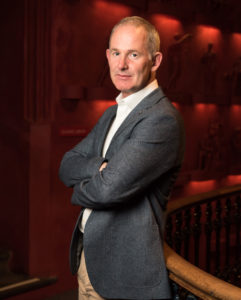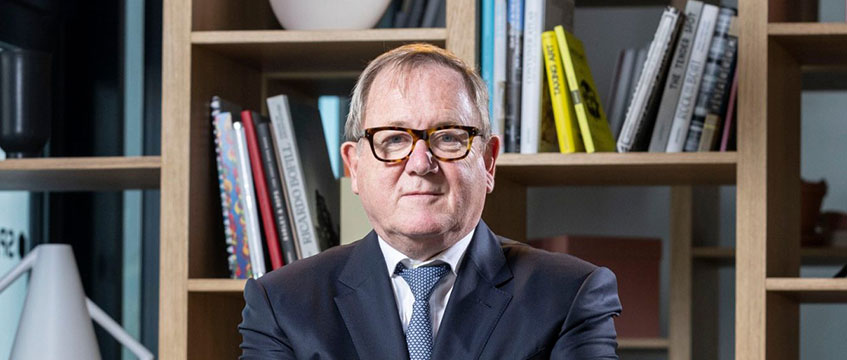Mark Logan turned Skyscanner from small Scottish startup to household name for online travel bookers with a valuation that plucky entrepreneurs could only dream of.
With experience in California’s Silicon Valley, and having played a key role in the takeover of Scottish tech firm Atlantech by Cisco for $180m in 2000, Logan was appointed to Skyscanner in 2012 to oversee the general management of the business.
He grew the team from 90 people to a multi-national cohort of 1,000 in locations across the world, making it fit for a £1.5bn acquisition by Chinese travel giant CTrip in 2016, which was at the time the biggest exit for a tech start up in Europe.
Logan left Skyscanner after the CTrip deal and is now giving other promising startups his magic touch – as well as appearing on the odd panel debate, such as EG’s Edinburgh Question Time back in September.
As someone who knows all too well the importance of office space to scaling tech companies, as well as having the ability to recognise and solve the challenges they face in their ambitions for global domination, property leaders embracing and exploring tech could do worse that take a leaf from his book.
More than just an office
Just after the the CTrip buyout, Skyscanner grew its London headcount five-fold, adding 100 more employees this year.
It prompted the firm to take 24,000 sq ft across the top three floors of London’s The Avenue, W1, the West End office and retail development by Ashby Capital and Exemplar. This makes Skyscanner the latest in a growing band of creative and tech companies moving to the area around Tottenham Court Road, including Facebook, Estee Lauder, and NBC Universal.
In addition, it has offices in nine cities across the world. And though the company is recruitingactively in cities including Glasgow, Edinburgh Barcelona, Singapore and Miami, there are no current plans, according to a spokesperson, to open a new office.
“The accommodation space for a tech startup is more important than even what a company’s own employees generally ever realise,” said Logan.
“It sends a message as to the ambition of the company. When we first relocated in Edinburgh from legacy offices to a purpose-built glass building, the message that people implicitly picked up, by both employees and external people, was that we were serious about making a global impact.”
Logan is known for his unorthodox leadership talks, using warfare tactics, chess analogies, film excerpts and political debating as examples.
At first it is difficult to imagine him taking such a canny approach in an office environment, let alone a tech office kitted out with boldly-coloured furniture and innovation zones.
An unassuming, measured and softly spoken manner belies a man who is sharp, wily and so evidently in tune with people and growth dynamics.
“Software is a people problem, not a tech problem,” he said. “You can build anything a market wants, but can you construct the team to do that and drive it?
“In scaling a tech company you need to put enormous investment into the development and learning of your staff and encourage them to take risks, make mistakes and learn from them. That’s a hard culture to set up, but if that culture does not underpin the company then it will run out of steam.”
The beginning
In order to simplify the process by which people search online for flights and travel destinations and the myriad options that come with it, Skyscanner integrated with more than 12,000 airlines and travel agents, and latterly hotel and car rental companies. It does not rank them, or charge commission, and it is this integrity that Logan believes has earned it such a following.
The company makes its money by taking a small referral fee from airlines and travel agents, which, when you have 60m users, adds up to a “rather big business”.
Getting airlines to buy into the initial concept was a challenge, however, as the platform was disrupting the flow of traffic to its own websites.
“The airlines just wished we’d go away and so initially there was very little collaboration. But over time they realised we were actually bringing people to their websites who wouldn’t have because a lot of people, including myself, want to search for options and know they’re getting the best deal.
“And you’ll see that now Skyscanner is evolving its product so that it is bringing the airline’s web experience, or app experience, right into its site. That’s good for the users and it’s good for airlines because they can upsell the things they have available,” said Logan.
Data makes decisions
While the property industry increasingly grapples with the challenges of collecting data, and making sense of it, many people in the sector will be reassured by Logan’s belief that, while it should be gathered where it can, decision-making should not be based on data alone, but blended with “art and qualitative judgement”.
Skyscanner produces up to a terabyte of data each day, and uses it to continue to develop the product so that it meets the demands of its users and airlines.
The decision to integrate the airlines’ own interfaces onto the Skyscanner site, so the user does not leave the site in order to make a booking, for example, was made based on that data.
Logan warns that data is not perfect, however, and accurate interpretation including spotting meaningful patterns, and separating them from coincidental patters, is the key to making it useful.
“There’s a famous quote from one of the Silicon Valley CEOs that goes ‘if we’ve got data to make decisions we’ll use data and if we’ve got opinions, we’ll use mine’. That’s what we’re trying to get away from.”
The future of tech
Logan is putting his bets on machine learning being the next piece of technology to alter the way we live and work – to a greater extent than the mobile device has ever done, he reckons.
“We’ll see businesses, including tech businesses, resistant to the idea that machine learning is relevant to them. People will be afraid of how much it will change their jobs, just as they have been with other waves of technology. But of course some companies won’t resist it, and that is why often two-person startups wipe out big companies, because those startups don’t have legacy, or anything to defend, and they embrace new technology and build on it.
“Remember, Google was just two people a couple of decades ago and now it’s an extraordinarily valuable company, and I wouldn’t bet on Google necessarily being in that position in 20 years’ time.”
To send feedback, e-mail Rebecca.Kent@egi.co.uk or tweet @Writer_RKent or @estatesgazette











